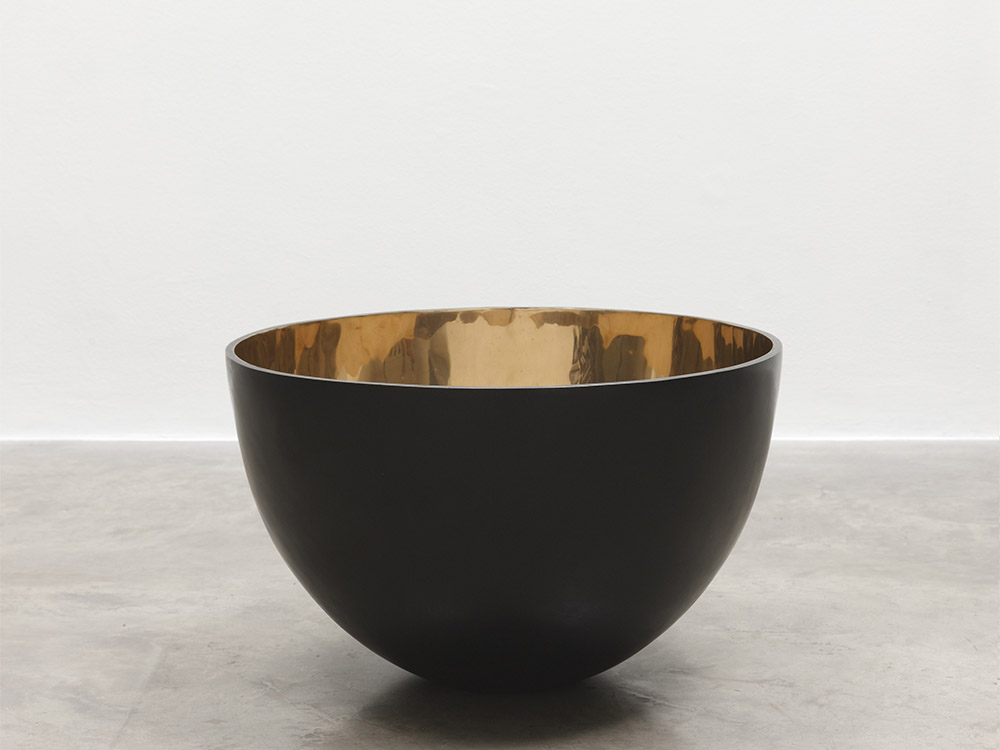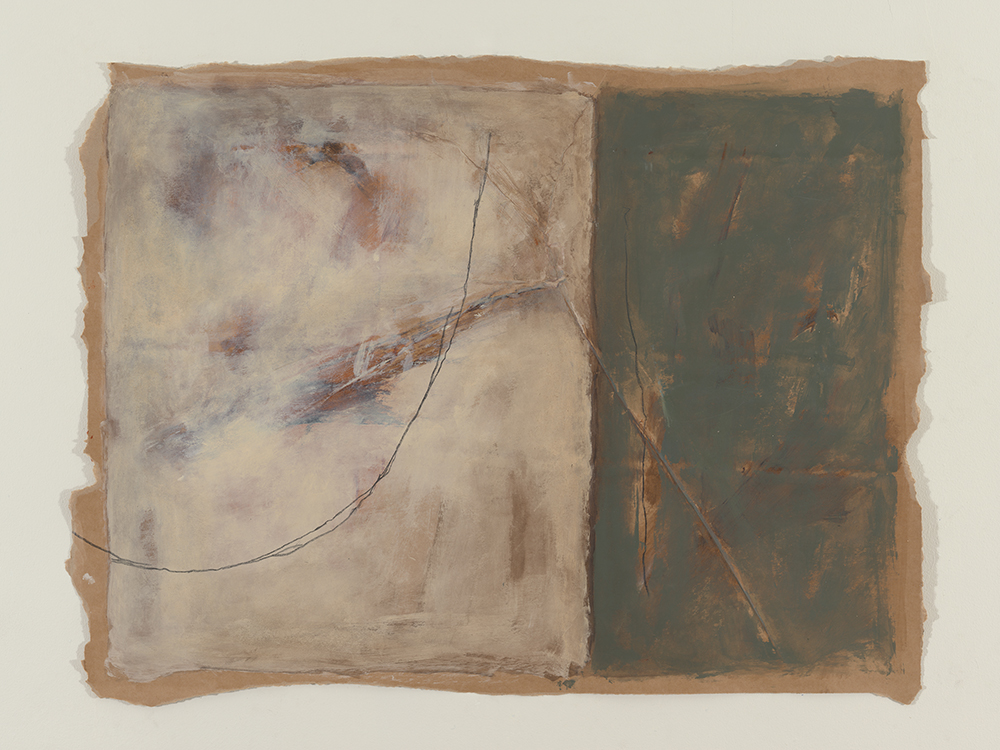Thursday, October 31, 2019
Saturday, October 19, 2019
Larry Mullen Jr. giving a keynote speech at ISHA2019 in Madrid
Larry delivering a keynote speech in Madrid, to advocate for health equity in orthopaedics.
“I’m one of the privileged... It’s not about me it’s about everybody else.", on how everyone should be able to access the level of care he had for his surgeries.
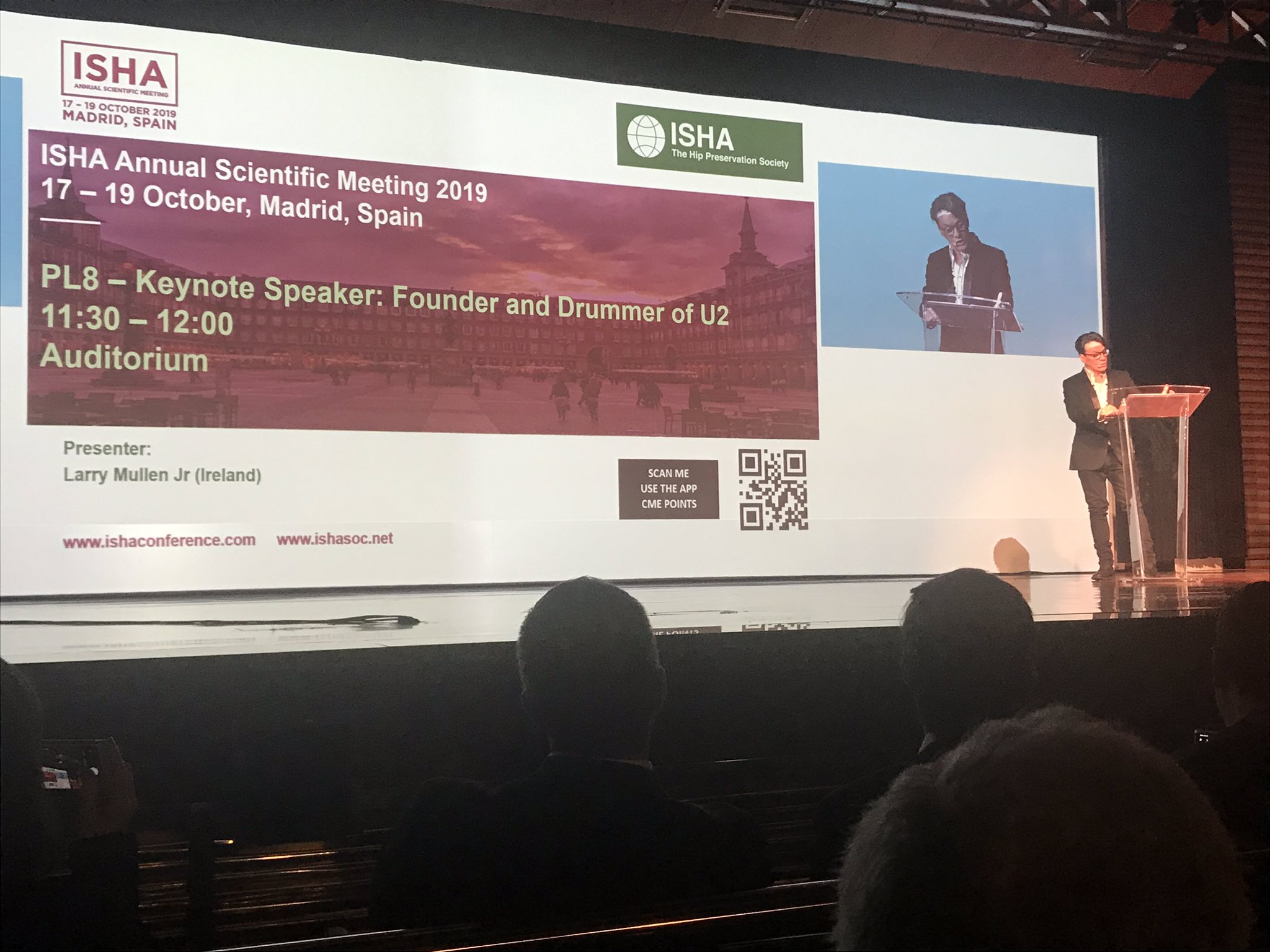
ISHA has been the creation of many individuals, each united by a common interest in the expanding arena of hip arthroscopic surgery. Officially formed in Paris (France) in May 2008, ISHA’s Founding Members represent but a few of the many individuals around the world who are interested in this evolving area of hip surgery.
Adam Clayton Chooses Songs on “Time to Listen”
Adam Clayton has appeared all week long on Absolute Radio in the UK, on Danielle Perry’s show. The show was focused this week on promotion of mental health conversations, and throughout the week a special segment called “Time to Listen” aired. Adam Clayton appeared on the segment on each of four nights, starting Monday October 14, and wrapping up on Thursday October 17.
The four songs that Adam chose to highlight this week are the following:
“Substitute” by The Who
“Into the Valley” by The Skids
“Helter Skelter” by The Beatles
“Anarchy in the UK” by The Sex Pistols
Adam Clayton has been supporting mental health initiatives for many years, most notably for his work with Walk In My Shoes in Ireland.
The members of U2 have often contributed playlists to various publications and we have collected others here, including Adam Clayton’s all time favourite tracks which he contributed to GQ. Although that playlist contained tracks from The Who, The Beatles and The Sex Pistols, none of the songs listed above were included in the list.
Aaron J. Samshttps://www.u2songs.com
Tuesday, October 8, 2019

Bono appears on the second episode of Hozier’s “Cry Power” podcast.Hozier has created this podcast in collaboration with Global Citizen. The podcast series will see Hozier speak with musicians, artists, writers, campaigners about how to take action and change the world.
www.globalcitizen.org
https://hozier.com/cry-power-podcast/
Tuesday, September 24, 2019
U2 TO WORK ON NEW ALBUM SOON, RYAN TEDDER SAYS MAKING IT "WILL BE EASIER"

In an interview today with the Italian music news site Rockol, Ryan Tedder said U2 asked him to meet them in Los Angeles to start work on U2's next album.
"I spoke to them just last week. We will work together on some new pieces when I am in Los Angeles," Tedder told Rockol.
"I think it's their intention to make a record the last two. It will be easier. You know, it's like a pendulum.
When you make a very produced album, with so many instruments in it, the next project you want it more what if the disc had the sound of four musicians playing in a room?" Tedder, whose songwriting, production and performance credits on hits for U2, Beyoncé, Madonna, Adele and Taylor Swift have elevated him to an elite status, is also man to releasing a new One Republic album next month and a new tour in the summer of 2020.
"Working with a band like U2," comes with difculties Tedder said in his interview with the Italian language site Rockoi. "Bono and The Edge are like conductors. They assemble the songs by taking the melody from a demo, the chords from another, the strings from a third audition. With them a song is never nished."
"U2 are the best group on the planet, but with them it is not uncommon to produce 70 versions of a single song," Tedder said. There is no indication at this time as to when Tedder will be in Los Angeles to work with U2. One Republic has not announced any performances for Los Angeles for t U2's The Joshua Tree Tour 2019 begins November 8 in Auckland, New Zealand.
As a matter of speculation only, U2 might choose to conduct some tour rehearsals in and could work on new songs with Tedder as soon as next month. Tedder's previous credits with U2 are for production and performance on Songs of Innocence (2014) and Songs of Experience (2017). Though uncredited as a songwriter said he and One Republic bandmate Brent Kutzle wrote part of U2's song "Summer of Love."
source:@U2
Thursday, August 8, 2019
Happy Birthday, Edge!!!
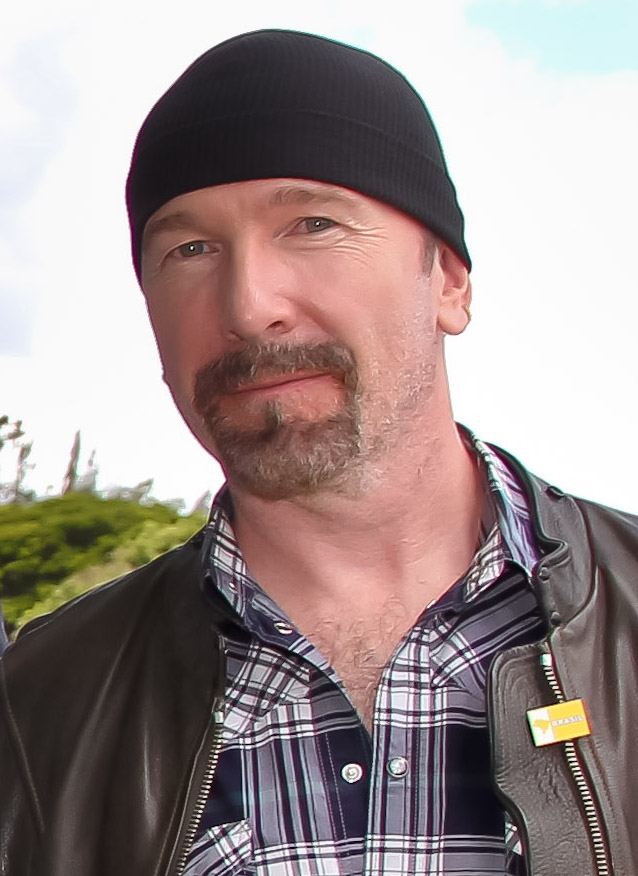
HAPPY BIRTHDAY EDGE!!! THE BEST OF DAYS FOR YOU!!!
Wednesday, August 7, 2019
Bono and Guggi: A friendship based on art, punk rock and Jesus
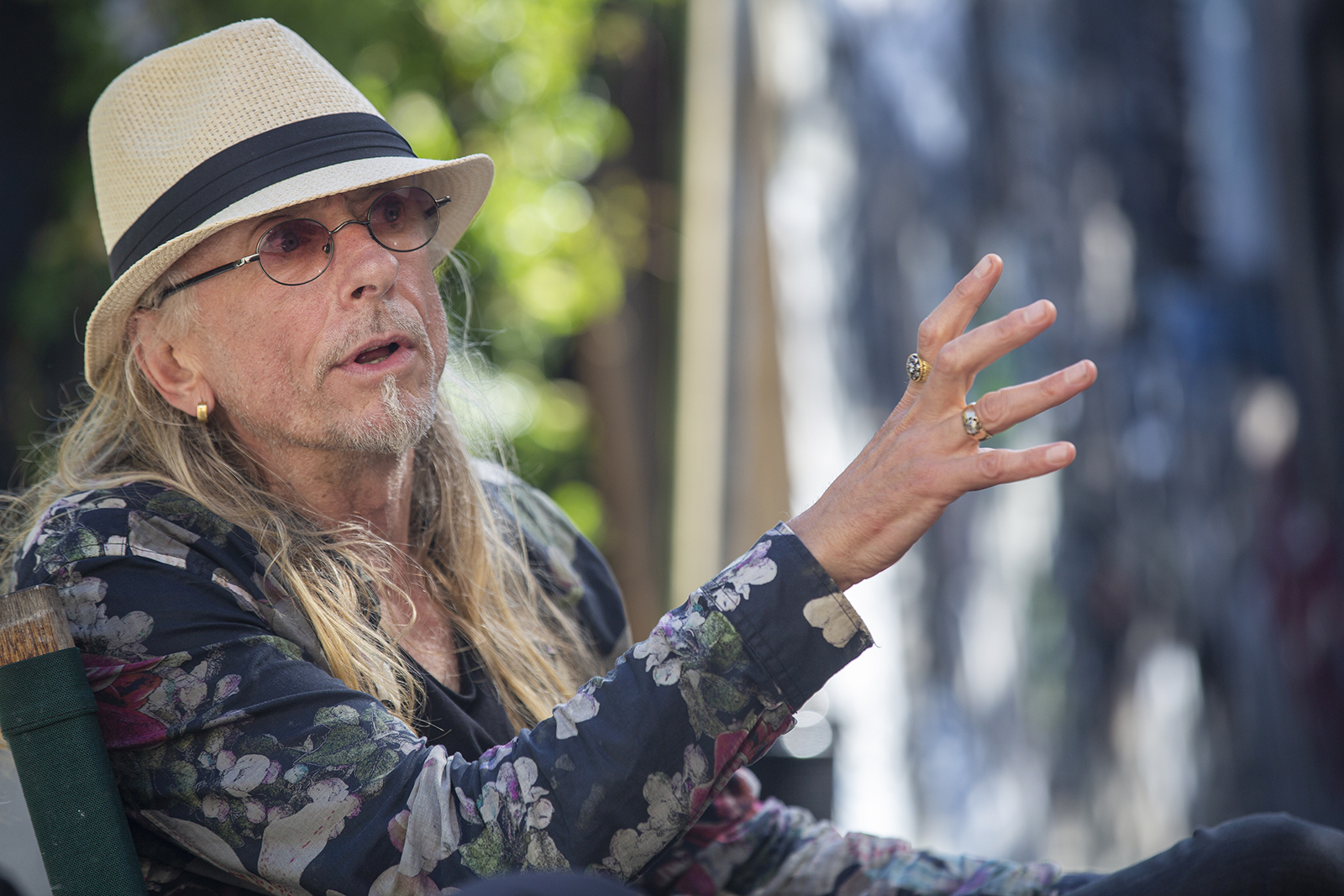
Artist Guggi discusses his background and his new show, “My Cup Overflows,” at Arcane Space in Los Angeles in June 2019. RNS photo by Bhushan Thakkar (www.20evo.com)
VENICE, Calif. (RNS) — At the height of Ireland’s sectarian Troubles in the early 1970s, when he was not long out of diapers, Paul Hewson met Derek Rowen, a neighbor boy from a few houses away in their working-class Finglas neighborhood of North Dublin.
The Hewson family lived at No. 5 Cedarwood Road.
The Rowens — all dozen of them — occupied No. 10.
More than 50 years (and two famous nicknames) later, Hewson, aka Bono of U2, and Rowen, the contemporary artist better known as Guggi, remain the best of friends.
As children, they bonded over a shared love of punk rock, mischief making and Jesus.
As men, they have channeled the spiritual, cultural and personal tumult of their youth into art.
For Bono, it became music.
Guggi, abstract art.

Musician Bono, left, and artist Guggi grew up together in Ireland. Video screenshots
“Myself and Bono, we weren’t like the other kids in the street and we knew we weren’t,” Guggi told Religion News Service recently during “My Cup Overflows,” an exhibit of his new works at Arcane Space, a gallery in the Venice neighborhood of Los Angeles co-owned by Morleigh Steinberg, wife of U2 guitarist The Edge.
“I was seen as an oddball, a freak,” said Guggi, who turned 60 in May and is 362 days older than Bono. “We didn’t know what to say when they would want us to name our favorite football players because we didn’t know any names. We could get beaten up for supporting the wrong team or not supporting anybody.”
One thing they did have in common was an interest in developing their Christian faith.

Bono performs on The Joshua Tree Tour in Indianapolis in Sept. 2017. Photo by Daniel Hazard/Creative Commons
Bono’s parents had what was considered to be a “mixed marriage” at the time — his father, Bob, was Catholic, his mother, Iris, Protestant. Bono and his older brother, Norman, were reared in the Church of Ireland (the Irish iteration of the Episcopal Church).
Guggi was rarer still in the predominantly Catholic Republic of Ireland, where he was born into a devoutly religious family rooted in the Christian Brethren (Irish cousin of America’s Plymouth Brethren) tradition. He is the second oldest of 10 children (seven boys and three girls).
Guggi brought up his own children religiously in one of Dublin’s Baptist churches. “It just happened to be a Baptist church — I’m not interested in brand names, I just wanted the message as it is in the Gospels,” he said.
His father, Robbie, who turns 86 this month, was and remains something of a zealot.
Bono once told me that the elder Rowen was “straight out of a Flannery O’Connor novel — it was like the prophet Jeremiah lived on our street.”
“I always remember the color of the language he used when he preached at us and the conviction of the words he used,” he told me in a 2005 interview.
Guggi describes his spiritual upbringing as “strict, Puritan,” and says his father ruled his family with an iron fist. And yet he had a genuine faith that has compelled a lifelong generosity.
“Bono came to his faith through my dad. And I came to faith through my dad,” Guggi said.
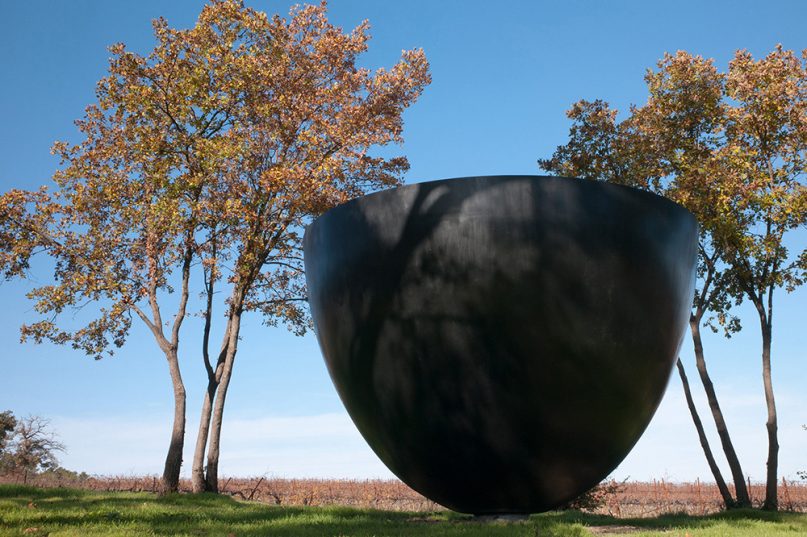
“Calix Meus Inebrians” by Guggi in France. Photo courtesy of Chateau La Coste
The eccentric elder Rowen was a virtuoso salesman, first for Eveready batteries and later for Raleigh and Peugeot bicycles, with a passionate, if sometimes overbearing, faith. He was also a consummate collector — of motorcycles, boats, “anything with wheels,” and once, a flock of sheep.
Bono’s mother, Iris, died when he was 14. After her death, Bono spent a lot of time at Guggi’s house, where he fell in naturally among the 10 Rowen siblings.
Guggi persuaded Bono to attend a Bible camp when they were tweens.
“My Dad would send us to the YMCA where they had something called the ‘boys department’ where boys went — not boys and girls, just boys — and the boys department went on a camp every year, Guggi said.
It was called “camping,” but it was more like sleeping bags on the rec room floor, he said.
“We slept in tents maybe a couple of times, but it was mostly school halls, church halls, that kind of thing, and yeah, myself and Bono went there every summer,” he said.
Like his friend Bono, Guggi tried his hand at music.
As a teenager, he formed a band, The Virgin Prunes, with Gavin Friday (another childhood friend of Bono’s), Dik Evans (brother of U2’s The Edge), and others.
The Prunes, who disbanded in 1990 and still have a hearty cult following in parts of Europe, incorporated elements of goth, performance art, and cross-dressing into their performances.
Guggi left the Prunes in 1984 to focus full time on his artwork.
It was about this time, at his grandmother’s funeral, that he heard a message that changed the way he understood his calling as an artist.
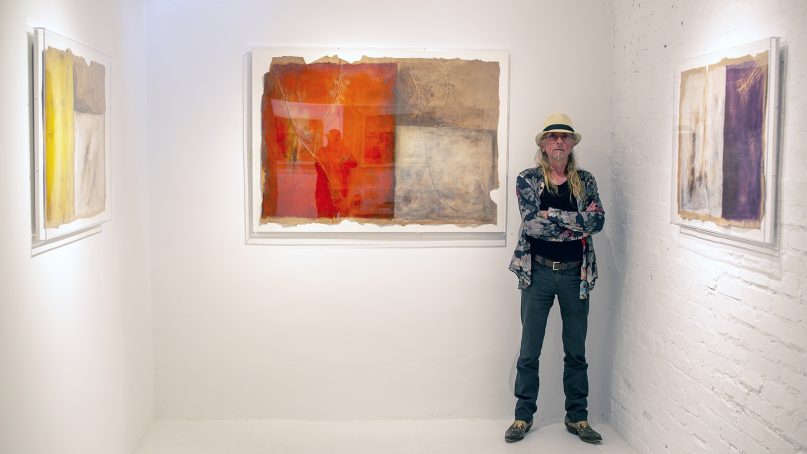
Modern artist Guggi poses with some of his “Broken” paintings at his exhibition, “My Cups Overflows,” in the Arcane Space in Los Angeles. RNS photo by Bhushan Thakkar (www.20evo.com)
“I’ve drawn and painted since I was a child, and I kind of started feeling guilty about it — what am I adding here? What am I bringing to society?” Guggi said. “But then this preacher at my grandmother’s funeral said, ‘If we are created in God’s image, we must in some way be like him. And if God is the creator, we must also be creative.’ That just struck a chord with me — that art isn’t just enough to do, it’s a special thing to do. I feel incredibly privileged to be able to paint, to be able to make pictures and sculptures.”
Now one of Ireland’s most celebrated modern artists, Guggi is perhaps best known for featuring empty bowls, jugs, spoons and other quotidian objects in his work, whether in oil, mixed media or sculpture.
Those works include a massive 15-foot-tall, 7,000-ton bronze bowl titled “Calix Meus Inebrians,” which stands among the grape vines at the Chateau La Coste vineyard in Aix-en-Provence, France.
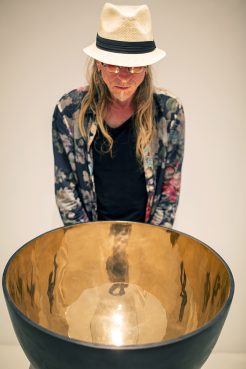
Guggi with his artwork “Poculum ex Vinea” at the Arcane Space in Los Angeles. RNS photo by Bhushan Thakkar (www.20evo.com)
A 100-pound, nearly two-foot-tall bronze bowl titled “Poculum ex Vinea” (“a cup of vines”) is featured in Guggi’s new exhibition alongside a series of paintings on brown paper called “Broken.” The art historian and poet Kevin Grovier described the work this way: “By salvaging beauty from distress, soulfulness from fragmentation, Guggi creates objects from another world.”
The artist himself isn’t too keen on analyzing his artwork — “It’s not a verbal medium,” Guggi said.
He added that, “artists should be more like Victorian children: seen and not heard.” But he admits there is a spiritual connection to his habit of focusing on vessels and finding the sacred in the ordinary.
“I’m merely a channel, and it comes through me and I’m available for service in that sense,” Guggi said.
He started with portraiture, inspired by photos he took of a peculiar street preacher — a woman who was part of a fundamentalist Catholic sect.
“She would have a child’s glove in one hand and some literature or something in the other and she’d be waving it around,” Guggi said. “She was quite bonkers, but she did have a great face.”
He made countless abstract portraits based on the woman’s face until he realized what he was drawing wasn’t the curve of her face, it was a bowl.
“That was what led to taking simple, common, everyday objects that we walk past all the time, and we don’t notice are there, that are functional. I started painting these objects, and I never stopped,” Guggi said.
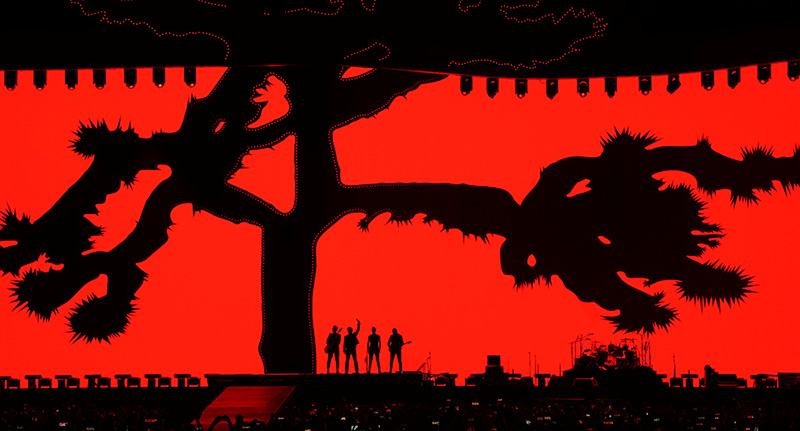
U2 on stage during the opening concert of their global The Joshua Tree Tour 2017 in Vancouver, British Columbia, Canada, on May 12, 2017. Photo by Nick Nidlick/Reuters
During the recording of U2’s “The Joshua Tree” album in 1985, Bono summoned Guggi and Gavin to their local pub, known as The Gravediggers, to ask a favor.
“He said, ‘Look, I want to paint. We’re putting this album together, we’re making this record, but I need to get away from that,’” Guggi recalled. “Bono always loved painting, and we painted together as children, as teenagers.”
Bono set aside a room in the large manor house where the band was recording “The Joshua Tree” and asked Guggi to fill it with art supplies, which he did.
The trio — Bono, Guggi and Gavin — joined by a fourth friend, Charlie Whisker, who would go on to direct videos for U2 and Bob Dylan among others, would gather on Wednesday nights to make art. A year after the album came out, the friends hosted a group exhibition of their work at a Dublin art gallery called “Four Artists, Many Wednesdays.”
The exhibit also included photographs Bono had taken on his first visit to Africa during the Ethiopian famine in 1985.

Modern artist Guggi, right, speaks with guests during an opening for his exhibition, “My Cups Overflows”, at the Arcane Space in Los Angeles in June 2019. RNS photo by Bhushan Thakkar (www.20evo.com)
Like most longtime friends, over a lifetime the men have shaped each other. For instance, both are fathers — Bono has four children, Guggi has five (all boys) — and have sons named Elijah. Bono’s oldest son is Elijah Bob Patricius Guggi Q Hewson.
When the lifelong friends speak, sometimes you can hear whispers of one in the other.
“I am a believer, 100 percent,” Guggi insists when the conversation circles back to matters of faith. “I’m not a very good example of one, but you’re either in or you’re out.”
Bono, whose lyrics are laden with spiritual and biblical imagery and who in recent years has been quite open about his Christian faith, has famously said, “I’m not a very good advertisement for God.”
On U2’s perhaps most autobiographical album to date, 2014’s “Songs of Innocence,” Bono dedicated a song to Guggi called “Cedarwood Road.” It says in part:
“I was running down the road
The fear was all I knew
I was looking for a soul that’s real
Then I ran into you…
Symbols clashing, bibles smashing
Paint the world you need to see.”
Guggi’s show “My Cup Overflows” runs through the end of August, by appointment, at Arcane Space.
Thursday, June 13, 2019
Bono: "Anger is a source of energy"
To celebrate the 70th anniversary of the French magazine Paris Match, Olivier Royant interviewed Bono in Belfast, Ireland.
"...A little by surprise, he entered the room and already tames the space. Bono left the rugby match he was watching in his suite with his wife, Ali, to meet me. Immediately, we are seized by his benevolence and immediate contact, so far removed from the image of a global rock star. This Elizabethan-style palace, with walls adorned with aristocratic portraits, overlooking Belfast Bay, seems a bit pompous to talk about rock and politics. Through large windows come the laughter of a wedding cocktail under a gray sky. Son of a Protestant and a Catholic, Bono shows me on his cell a picture of the olive tree in pot that Pope Francis recently offered him. "He is the symbol of the three religions," he told me. Plant it anywhere, it will grow. "
Paris Match. How do you react to this wave of hatred that has invaded world politics?
Bono.: Our generation grew up thinking, like Martin Luther King, that the world was moving toward more justice, civil rights, gender equality. Here in Ireland, a wall fell. Elsewhere, democracy prevailed, apartheid was defeated. This luminous parenthesis of humanity is nothing compared to ten thousand years of history. Our grandfathers are no longer here to remind us of the tragedies that Europe has known. This wave of alarming elections marks the death of our innocence. Faced with this decline, a tip: stop lamenting, organize yourself!
Do you recognize in these spontaneous movements young people who mobilize for the climate?
It reminds me of our beginnings, when I listened to Public Image Limited songs and felt anger rising up against injustice. Anger is a source of energy.
In your concerts, you hoist the European flag. You have faith in what Churchill called "expanded patriotism": to be simultaneously Irish and European ...
Yes, it's a romantic idea and it's the most beautiful of all. All these different languages to form a single voice. Being European is a thought that must become a feeling. Europe has been transformed into bureaucracy. It must change, reform from within, but it must not be left.
"...A little by surprise, he entered the room and already tames the space. Bono left the rugby match he was watching in his suite with his wife, Ali, to meet me. Immediately, we are seized by his benevolence and immediate contact, so far removed from the image of a global rock star. This Elizabethan-style palace, with walls adorned with aristocratic portraits, overlooking Belfast Bay, seems a bit pompous to talk about rock and politics. Through large windows come the laughter of a wedding cocktail under a gray sky. Son of a Protestant and a Catholic, Bono shows me on his cell a picture of the olive tree in pot that Pope Francis recently offered him. "He is the symbol of the three religions," he told me. Plant it anywhere, it will grow. "
Paris Match. How do you react to this wave of hatred that has invaded world politics?
Bono.: Our generation grew up thinking, like Martin Luther King, that the world was moving toward more justice, civil rights, gender equality. Here in Ireland, a wall fell. Elsewhere, democracy prevailed, apartheid was defeated. This luminous parenthesis of humanity is nothing compared to ten thousand years of history. Our grandfathers are no longer here to remind us of the tragedies that Europe has known. This wave of alarming elections marks the death of our innocence. Faced with this decline, a tip: stop lamenting, organize yourself!
Do you recognize in these spontaneous movements young people who mobilize for the climate?
It reminds me of our beginnings, when I listened to Public Image Limited songs and felt anger rising up against injustice. Anger is a source of energy.
In your concerts, you hoist the European flag. You have faith in what Churchill called "expanded patriotism": to be simultaneously Irish and European ...
Yes, it's a romantic idea and it's the most beautiful of all. All these different languages to form a single voice. Being European is a thought that must become a feeling. Europe has been transformed into bureaucracy. It must change, reform from within, but it must not be left.
You were in Paris on November 13, 2015, the day of the terrorist attacks. How did you live these moments?
Sheltered in our golden cage, our hotel rooms, where we watched television while gunshots rang around the Bataclan. At twenty-four hours, our show Bercy could have been the target of terrorists. I thought, "More than anything, these men hate what I love most in the world: music and women."
Find all of this interview in the exceptional anniversary issue of Paris Match
www.parismatch.com
translation:@mysteriousdistance
Tuesday, June 11, 2019
'Bono's A Life-Changer': Bullied Teen's Turnaround Inspired by Encounter With Singer
Chloe Howard loves telling young people how Bono changed her life.
After, that is, first telling them who Bono is.
“I won’t assume you know,” Howard recently told an assembly at Union Middle School in San Jose, “but he’s basically the biggest rock star in the world.”

A chance encounter with the lead singer of U2, Howard says, is the spark that helped her transform from a depressed, withdrawn victim of assault to an inspirational speaker in demand around the world.
“Bono’s a life-changer, man,” Howard said.
Howard, a 19-year-old college freshman, was born with a severely clubbed foot. It was a condition that required multiple surgeries, months in casts, and long stretches on crutches to deal with. Even with those hurdles, Howard says her supportive parents helped her be at peace with her disability.
Unfortunately, that peace was shattered her freshman year of high school in Marin County.
On Nov. 20, 2014, a couple of high school bullies decided to hold her down and rip off her shoes and socks, exposing her feet for anyone within view of the assault to gawk at.
“Seeing all the scars and the permanent discoloration and all the spots on my toes where toenails should be but weren't,” she said. “I saw this foot for the first time in my life as something that was ugly. That wasn't an image that I could erase from my mind.”
The assault left Howard with a new scar, but not a physical one. She fell into a depression, isolating herself from friends and family. This was her “sweatshirt phase,” as she called it.
“I started wearing these massive sweatshirts to school in hopes of hiding myself,” she said. “I started suffering from PTSD, quickly diagnosed by my therapist.”

But then came hope for Howard, in the form of a massively successful international rock star icon.
Howard’s father won a contest where the prize was backstage tickets to meet Bono. Howard said she was shy, but worked up the courage to tell Bono the story of her clubfoot and subsequent assault.
“Bono looked at me and he said, 'Chloe, what happened to you is an injustice, when you use your voice, when you speak out and tell your story, you're speaking for those who can't speak for themselves',” she said.
Howard said Bono’s words were so meaningful, she knew she had to be that voice to speak for others that might be going through similar situations.
“I wanted to believe my story was going to continue, my assault wasn't the end of Chloe Ruth Howard as the world knew her,” she said.
One year later, Howard was standing on a stage in Santa Barbara, sharing her story in a TED Talk.
She labeled her story, “Stand Beautiful,” and now speaks to groups all over the world, sharing the message of against bullying and for self-acceptance.
Kids these days need to be reminded that they have a purpose in life, said Howard. This was something she shared with the students at Union Middle School.
After her assault, Howard told the kids, the perpetrators were put on trial and found guilty of battery.
“That process was exhausting, so hard and so overwhelming at ages 14, 15 and 16 going through all of this,” she said. “No one has the right to touch anyone without their consent, ever.”
Many kids in the audience stuck around after Howard’s speech to share their own stories of bullying and express their gratitude for Howard’s ability to embody the phrase, “Stand Beautiful.”
www.nbcbayarea.com
After, that is, first telling them who Bono is.
“I won’t assume you know,” Howard recently told an assembly at Union Middle School in San Jose, “but he’s basically the biggest rock star in the world.”

A chance encounter with the lead singer of U2, Howard says, is the spark that helped her transform from a depressed, withdrawn victim of assault to an inspirational speaker in demand around the world.
“Bono’s a life-changer, man,” Howard said.
Howard, a 19-year-old college freshman, was born with a severely clubbed foot. It was a condition that required multiple surgeries, months in casts, and long stretches on crutches to deal with. Even with those hurdles, Howard says her supportive parents helped her be at peace with her disability.
Unfortunately, that peace was shattered her freshman year of high school in Marin County.
On Nov. 20, 2014, a couple of high school bullies decided to hold her down and rip off her shoes and socks, exposing her feet for anyone within view of the assault to gawk at.
“Seeing all the scars and the permanent discoloration and all the spots on my toes where toenails should be but weren't,” she said. “I saw this foot for the first time in my life as something that was ugly. That wasn't an image that I could erase from my mind.”
The assault left Howard with a new scar, but not a physical one. She fell into a depression, isolating herself from friends and family. This was her “sweatshirt phase,” as she called it.
“I started wearing these massive sweatshirts to school in hopes of hiding myself,” she said. “I started suffering from PTSD, quickly diagnosed by my therapist.”

But then came hope for Howard, in the form of a massively successful international rock star icon.
Howard’s father won a contest where the prize was backstage tickets to meet Bono. Howard said she was shy, but worked up the courage to tell Bono the story of her clubfoot and subsequent assault.
“Bono looked at me and he said, 'Chloe, what happened to you is an injustice, when you use your voice, when you speak out and tell your story, you're speaking for those who can't speak for themselves',” she said.
Howard said Bono’s words were so meaningful, she knew she had to be that voice to speak for others that might be going through similar situations.
“I wanted to believe my story was going to continue, my assault wasn't the end of Chloe Ruth Howard as the world knew her,” she said.
One year later, Howard was standing on a stage in Santa Barbara, sharing her story in a TED Talk.
She labeled her story, “Stand Beautiful,” and now speaks to groups all over the world, sharing the message of against bullying and for self-acceptance.
Kids these days need to be reminded that they have a purpose in life, said Howard. This was something she shared with the students at Union Middle School.
After her assault, Howard told the kids, the perpetrators were put on trial and found guilty of battery.
“That process was exhausting, so hard and so overwhelming at ages 14, 15 and 16 going through all of this,” she said. “No one has the right to touch anyone without their consent, ever.”
Many kids in the audience stuck around after Howard’s speech to share their own stories of bullying and express their gratitude for Howard’s ability to embody the phrase, “Stand Beautiful.”
www.nbcbayarea.com
Friday, May 31, 2019
A U2 biopic?
U2 could follow in the footsteps of Queen and Elton John as the latest pop icons to get the big screen treatment, according to bassist Adam Clayton.
The recent box office triumphs of Bohemian Rhapsody and Rocketman have sparked a rush in Hollywood for the next big rockstar biopic – with films about everyone from Arethra Franklin to Boy George and even Creation Records boss Alan McGee reportedly in the works.
Speaking to Chris Moyles on Radio X today, 59-year-old Clayton said Bono and the boys would be more than happy to have a movie made of their lives.
After the Irish musician announced the latest leg of U2's Joshua Tree world tour, Moyles asked him: "How long do you think it’ll be before you boys get a little movie made about you?"
Clayton replied simply: "Let's say we're open to offers".
Even if it was to become a reality, any future U2 biopic wouldn't actually be the first time the band have been depicted on the big screen.
The 2011 musical comedy Killing Bono tells the story of young Irish rocker Neil McCormick and his younger brother Ivan, who attempt to become pop stars but can only look on as their secondary school friends U2 hit the big time.
All four band mates – Bono (Martin McCann), The Edge (Mark Griffin), Adam Clayton (David Tudor) and Larry Mullen Jr (Seán Doyle) – were depicted in the film, which was based on McCormick's 2003 memoir Killing Bono: I Was Bono's Doppelgänger.
Formed in Dublin in 1976, U2 have released 14 studio albums and are one of the world's best-selling music artists in history – having sold an estimated 150–170 million records worldwide.
The recent box office triumphs of Bohemian Rhapsody and Rocketman have sparked a rush in Hollywood for the next big rockstar biopic – with films about everyone from Arethra Franklin to Boy George and even Creation Records boss Alan McGee reportedly in the works.
Speaking to Chris Moyles on Radio X today, 59-year-old Clayton said Bono and the boys would be more than happy to have a movie made of their lives.
After the Irish musician announced the latest leg of U2's Joshua Tree world tour, Moyles asked him: "How long do you think it’ll be before you boys get a little movie made about you?"
Clayton replied simply: "Let's say we're open to offers".
Even if it was to become a reality, any future U2 biopic wouldn't actually be the first time the band have been depicted on the big screen.
The 2011 musical comedy Killing Bono tells the story of young Irish rocker Neil McCormick and his younger brother Ivan, who attempt to become pop stars but can only look on as their secondary school friends U2 hit the big time.
All four band mates – Bono (Martin McCann), The Edge (Mark Griffin), Adam Clayton (David Tudor) and Larry Mullen Jr (Seán Doyle) – were depicted in the film, which was based on McCormick's 2003 memoir Killing Bono: I Was Bono's Doppelgänger.
Formed in Dublin in 1976, U2 have released 14 studio albums and are one of the world's best-selling music artists in history – having sold an estimated 150–170 million records worldwide.
BY: Aidan Lonergan for www.irishpost.com
Thursday, May 16, 2019
Bono chats books and Harry Potter on “Open Book”
Bono shares his favorite books, how he fell in love with reading and which books he read to his girls, all on this episode of “Open Book With Jenna Bush Hager.”
www.today.com
www.today.com
Monday, May 13, 2019
Adam Clayton at Tommy Tiernan's show in RTE One
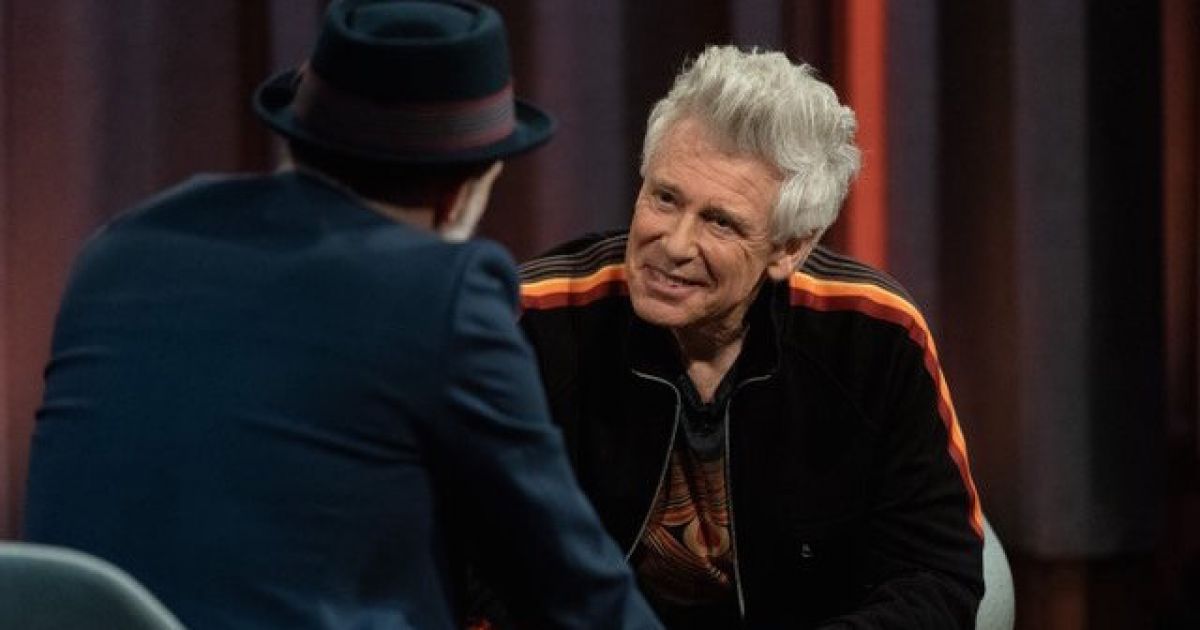
U2's Adam Clayton was the latest guest on The Tommy Tiernan Show and it was another candid interview.
Clayton opened up on the negative impact the band's worldwide fame had on him as well as his battle with alcohol.
“Success very much went to my head,” he said. “I think if you get everything your heart desires by – really we were making records by the time we were 20, by the time we were 25 and 26 we could pay our rent no problem, we owned cars, we could travel, and by the time The Joshua Tree hit we could buy a house – anyone I’ve met who’s experienced success and fame in that way in those years it takes them a long time to recover from it, and that sounds like a complaint but that’s just what happens.”

He added: "You lose your sense of yourself you lose a sense of reality. I was kind of very unhappy so I drank and I drugged and got myself in tabloid newspapers, and embarrassed kind of everyone I knew, and myself, but you know you come through it and you learn from it and maybe that’s what young men do anyway.”
Clayton said he has to “work really quite hard at keeping my sanity on and off the road, and my thinking can take me to bad places, my thinking is not always reliable," adding that it was a big plus having his bandmates around to "check" him.
Clayton said he's happiest during his time on stage with U2 when he can focus on nothing but the music.
Source of the video:Ultraviolet FanClub Brazil
Saturday, May 11, 2019
#Zero the Hero. An Interview with Neil McCormick

The British Library in London is one of the largest libraries in the world, so what could be a better setting to meet Neil McCormick, whose first novel, #Zero, has just been published? The reading room is silent, however, with way too little privacy to hold a conversation, let alone an interview with the chief music critic of the UK broadsheet The Daily Telegraph. We decide to move to a hotel lounge, where the clink of bar glasses offers a suitable rock ’n’ roll setting.
McCormick will be familiar to followers of U2. In 2006, he was the author of the best-selling authorized biography U2 By U2, a review of the band’s formation and subsequent 30-year history. This was preceded in 2003 by another nonfiction work, a memoir of McCormick’s life as a (failed) pop star, known in the UK and Europe as I Was Bono’s Doppelganger and in the USA as Killing Bono. The latter title was retained for a film starring Ben Barnes as Neil and Robert Sheehan playing the role of his younger brother and bandmate Ivan (a founding member of Feedback in September 1976, before their metamorphosis into U2 by early 1978). Last year the book-turned-film found new success as a play in London, this time known as Chasing Bono.
McCormick has been a journalist for nearly all his adult life. Upon leaving school in 1978 — Mount Temple Comprehensive in Clontarf, where classmates included Bono — Neil joined the team at Ireland’s Hot Press music magazine, where he worked for several years before moving to England in 1983. There he combined the role of aspiring pop star (in conjunction with brother Ivan, he had formed Shook Up!) with that of freelance journalist. When the band broke up, he became a full-time writer. For five years starting in 1991, he was a contributing editor at GQ magazine in the UK before joining The Daily Telegraph in 1996.
McCormick has interviewed many people in the music business, and continues to attend and review concerts several times each week. In recent years he has also been the presenter of the Vintage TV program Neil McCormick’s Needle Time, interviewing many of his favorite musicians.
So following our podcast interview with Neil McCormick in 2017 that covered the genesis of #Zero, we’re here to discuss his critically acclaimed new novel, recently published via Unbound in the UK.
So Neil, why write a novel?
Like most writers, I have always wanted to write a novel. Books are at the heart of my life. I’ve defined myself as a reader ever since I was a small child, and I always thought I’d be an author someday, but I kind of allowed myself to be hijacked by all these other dreams of music and performing. I think in terms of stories, and I have started many novels over the years; this is just the first one I have finished! As a journalist, I write nonfiction essentially all of the time — and I’ve gotten pretty good at it over the years. I really enjoy it, and I enjoy being part of the conversation about music that is going on in the world, but in journalism you are always bound by the restraints of the factual. You can’t just make stuff up. That is the nonfiction challenge: to create narrative out of things that actually happened. But with fiction there are no limits at all, and writing with that sense of freedom has been incredibly rewarding and great fun.
I’ve been writing since I was a kid, and back in my band days I was working on a novel called The Cannibal Sheep-Eaters, an apocalyptic romantic comedy. It was the name of a made-up punk band in Ireland. I got quite far into that, but when you are young, I think you are still growing very fast, and writing a book takes a long time, and I had a feeling of constantly outgrowing the work. All the books I started fell by the wayside, and maybe I needed to mature and just slow down before I was ready to return to fiction.
The world of journalism has been very good to me, and I have made a good living from it. But I don’t define myself as a journalist. I write songs, poetry and fiction, for my own pleasure. I’ve scripted some short films and sold a screenplay in the mid-’90s that I was very proud of, but it never got made. Those are all tough places to make a living. I think it’s something like only one in 20 books make a profit. That’s not why you take on something like this. Writing a novel for me has been a long time coming, but it is a chance to try my hand at perhaps the highest form of the writer’s art.
You grew up in Dublin, and went to Mount Temple Comprehensive. Did you study the works of the great Irish writers such as Joyce, Yeats, Wilde, etc.?
I have read them all, but not in school. We didn’t study the Irish curriculum in that way; our reading list was actually more modern literature such as The Great Gatsby, 1984 and Lord Of The Rings. We did do a lot of Irish poetry, so I became very familiar with Yeats, who I read to this day, and you can certainly hear his influence in U2’s songs. I was a voracious reader all through my school days but unfortunately I was always a bit of a rebel, and didn’t particularly like to read what I was told to. I remember smuggling a copy of Spike Milligan’s Adolf Hitler: My Part In His Downfall into the classroom. I would stick it inside whatever book we were supposed to be reading but I was giggling so much it gave the game away, resulting in having that book confiscated for two weeks. Much to my frustration.
You describe novel writing as taking a long time. So how long did it take you to write #Zero?
It probably only took me a few weeks of actual writing … but spread over nearly 15 years. The procrastination-to-writing ratio was particularly bad with this one.
The book is set in the music business, which has changed so much in the last 10 years, especially with streaming and social media. Did that influence the content of the book?
Absolutely. In fact, that was driving me crazy. Things changed so rapidly that if I put the book down for a year to work on another thing, the next time I’d look at it everything would be out of date. When I started it, Myspace was a new thing, then virtually took over the music business, then disappeared without a trace. You write a draft in the age of CDs, then return to the draft and downloading has taken over. So you make changes to incorporate downloading, and suddenly everyone is streaming. But the constant thing at the center of the story is the corrosive power of fame, and the way that was changing actually fed into my narrative. Fame has always been a tough thing for individuals to cope with, but it’s probably worse now than it has ever been.
Examining fame was a big element of my memoir, although I was really looking at it from the point of view of not becoming famous. This is about fame from the inside. I started to dream this up as a follow-up to Bono’s Doppelganger back in 2003, and I wrote three chapters for my agent, none of which have survived to the finished draft. Then in 2004 I was asked to write the U2 biography, which was an offer I couldn’t refuse. I thought that would take a year, but actually it took two years. So when U2 By U2 was completed in mid-2006, I went back to the novel, but the internet was changing music and I realized I would have to rethink my story.
The trouble is, the internet was changing the face of journalism, too, and work demands became pretty intense. I really had to change the way I worked, and there was a period of several years where I was very absorbed by that. Like a lot of writers, I was a terrible procrastinator! But the internet demands speed, it demands instant reactions, and it is voracious for copy whilst simultaneously undermining the economics of journalism, so I focused on just getting the words on the page, becoming an instant responder. Write first; edit later.
I have become a very fast writer — I found processes that helped me really write with focus and intensity. Ultimately that has helped me so much in writing the book. But it took me a while to come back to it, and by then, of course, everything had changed again and I kind of had to start from scratch. I went back to completing the book in 2010, and stayed in a cottage in Wiltshire where there was no phone signal, and no internet, and no interruptions at all, and experienced a miraculous epiphany of writing and rapture — so much so that the book went through changes that I hadn’t planned on. I effectively completed the first draft of the book in isolation, writing like a demon, 80,000 words in two weeks. But even that is not the same as the book that is in the shops now. That version had my hero Zero operating in a meta-fictional world populated by real pop and rock stars. But therein lay another pitfall …
What happened?
Amy Winehouse was featured in the book, as one of many walk-on parts interacting with my lead character, Zero. I knew Amy a little bit, and I figured I could ask her permission. And after she died in 2011, I was confronted by the danger of fictionalizing real lives, and I just had to rethink that whole concept. I mean, she died from the very kind of things that haunt Zero — the intense glare of fame opening up fissures in unresolved emotional issues dating back to childhood. I saw her just a month or so before she died, and I really thought she was back, that she was going to make it. Such a talent, such a tragedy. Anyway, that necessitated another rewrite, which was actually to the benefit of the book, because I got to make up a whole galaxy of imaginary pop and rock stars, and I had so much fun doing that. So we’ve got a lairy Scottish diva called Amber Smack in there now
There are still a number of guest appearances by famous music stars who interact with Zero.
Just a smattering of superstars to give it a bit of a real-world spine. It’s a bit of an in joke really. It’s Bono, Elton John and Sting, because I get along with them all and I was confident they wouldn’t sue me!
Why did the novel take so long to appear?
The publishing world is slow. And to be honest, my agent struggled placing the book. Publishers seemed to like it but they were confused by it. I have been in meetings being asked, “What is the genre?” I have no idea. I mean, it’s a story. It’s funny. It’s emotional. It’s exciting. But I don’t know where you stack it in a book shop. So eventually, we went to Unbound, which has been great because they have an independent mentality and don’t concern themselves with genres. It means the author has to do a lot of crowd-funding to make the first edition happen, but that has been interesting; it puts you in a very close and symbiotic relationship with your readers.
The original title of the book wasn’t #Zero, as I understand?
Yes, that’s right. I called my book Motherless Child, but my editor didn’t like it, and said it came across as a book title that only women would read! I hate that distinction. I kind of think it is in the Nick Hornby vein, who is like a woman’s writer for men. I have actually been in meetings where publishers have said, “We think this is a man’s book, but the problem is men don’t read books.” To which the only possible response is, “I’m a man, and I read books!” How did books become divided by gender? It’s nuts.
Anyway, the theme of Zero being a Motherless Child is at the core of the story. There are so many rock stars who grew up without their mother being present. John Lennon and Paul McCartney famously, and Bono, too. Is that absence part of the equation of fame? Over the years Bono and I have talked about the “God-shaped hole,” as he calls it — the need for love to replace the unconditional mother love most of us just took for granted. But Zero is certainly not Bono, as you will know if you can get past the sweary, obnoxious, drug-taking opening chapter!
Bono did give me the title #Zero, though. When I wrote I Was Bono’s Doppelganger, the American publishers didn’t like having the word doppelganger in the title. They thought their readers wouldn’t understand it. It was Bono who suggested calling it Killing Bono. He said, “There’s a lot of people who would wear that T-shirt.” And my publishers loved it. So similarly, when I had the same problem with Motherless Child, I was actually in Dublin with Bono, on the set of a video. I mentioned this to him, and he said, “What is the name of your character?” When I told him, he said, “That’s it — Zero — that’s the name of your book.” And I thought to myself, well this is someone who knows a thing or two about titles, and so I went with it. I added the hashtag though. So he can’t take all the credit.
Did Bono help with any aspects in the book?
I was writing about a young pop superstar, and I was intrigued how such a person would be able to pay for things. Bono told me about the American Express Black that features in the book, which is a kind of rock-star credit card. Just talking to him and being around his world gave me a lot of ideas, but there was one particular conversation about one aspect of the story that actually went on to become a major element of the narrative. He has a very quick-fire mind; he is always a good person to talk to about creative things. And he has always been very supportive [of] my writing and was very encouraging about my taking on a novel. He knows he’s in it. I sent him the offending chapter, and we’re still friends, so I will take that as a sign of approval!
I think Bono could write a novel. What do you think?
I believe he is writing his autobiography and that will be great. But the art of writing a novel is different to that of a memoir. It’s a whole other area of narrative and character skills. His thing is actually poetry; his lyrics stand up on the page. He often writes in character — The Fly being a good example, this devilish character dispensing bad wisdom. My hero’s manager, Beasley, has a bit of The Fly about him.
Bono is a great writer, and we’ve known that for a long time. Back in the 1980s he would sometimes write a journalistic piece and sent them to me via fax to give him an editorial opinion. And I’d look at them and they were depressingly brilliant! I’d just have to admit he didn’t need to make any changes. Maybe correct his spelling! He could definitely have been a critic; he has a very perceptive way of looking into art.
But he would have been really dangerous if he ever went into advertising or marketing. He is a great phrase maker. Imagine Bono trying to sell you expensive gadgets instead of saving the world. It doesn’t bear thinking about. His phrase-making is so good that when he quotes famous writers such as Sam Shepherd, more often than not he misremembers the phrases and actually improves them! I hope he is getting on with his memoir as it will be utterly rich and fascinating. I don’t think he needs a ghostwriter. But I’m available to correct his spelling.
How difficult was it to write U2 By U2?
It wouldn’t describe it as difficult, although it was a challenge putting the historical narrative structure in place. The early stuff was easy for me to work on, as I had the advantage of being there! I used ATU2 a lot in my research. There is a fabulous amount of fan-based resources out there packed with day-to-day factual detail. Most bands don’t have this at all; probably only The Beatles and Bob Dylan have as much written about them. In addition, I carried out over 100 hours of interviews. One of the challenges was to construct a narrative, to get to the truth, by simply using the four voices of the band.
Actually, Neil, I noticed some anomalies in U2 By U2, such as Bono stating that he remembers his mother (who died in 1974) coming to his bedroom to tell him that Elvis had died (Presley died in 1977). Those quotes make a good story, but did you deliberately leave them in?
Does it say that? OK, I am going to claim I left it in deliberately. I did leave some anomalies in for the fun of it, but you’d think I would have spotted a ghost of Bono’s mother. From the start of the project, I wanted it to be first-person: It is actually an autobiography, not a biography. The book is called U2 By U2, and I thought it was important that it come from their perspective, their four voices, and also of then manager Paul McGuinness. But everybody remembers things differently. I came across many contradictions and if they were insurmountable then I would insist that it was so wrong that it didn’t happen and couldn’t be included.
Bono has a creative imagination, and he tells a story to dig out a bigger truth, but I frequently had to explain that he was misremembering the timeline of events. But in fact, the same kind of contradictions would come from all four members, so there is usually no definitive version of the truth, just subjective truths, and leaving them in actually helps form a multifaceted picture of events and how they subjectively shaped the band. At least, that’s my story and I’m sticking to it.
Writing the book was like conducting an orchestra of voices, and I had to ensure that the voices were balanced and it wasn’t all just Bono and Edge, who are the most talkative. Larry and Adam’s perspectives are just as valuable, and very unique. As time went on, and we got to the end, they became more and more involved and changed some of their contributions. Even when the book was on the printing press, I can remember band members saying they wanted to change something! And we did it, too. At the end, Bono said to me, “Now you know what it’s like to be a producer of our albums.”
You have been involved in the music industry and music journalism for almost 40 years. If you were 21 years old again, what advice would you give yourself?
Well, interestingly, I was recently at a reunion of the Mount Temple class of 1978, where all the men are getting grayer and balder and the women have mysteriously gone blond! Ali was there and Edge usually comes, but Bono doesn’t tend to come as he thinks it might disturb the balance. And really he was class of ’77; he just got kept back because he failed his Irish exams and became a member of our class. Which suited him because it meant he could stay in school and practice with U2.
Anyway, we were sitting around a table late at night, and I remember someone saying, “What advice you would give to your teenage self?” And there was a kind of ruminative silence as we all thought about this weighty question. Finally, I piped up with: “Join U2!” To much laughter, it must be said. The only problem with that is I fancied myself as a singer, so we’d have had to kick Bono out. It doesn’t bear thinking about.
If I was really to give advice to my 21-year-old self, I might have said, “Calm down!” I was in a big hurry to get on with life. I grew up to become a writer, a newspaper columnist, a musician who released albums. I have had a play and a film and a TV show. I don’t know if my younger self would have been satisfied with that though. I was bent on superstardom. But this is my life and I wouldn’t have changed much.
It might have been nice to have had a more substantial music career. Would it have made me happier? Who knows? It is good to get validation for your art, and to be able to explore the most creative parts of yourself. But I have written this book about a character who achieves enormous fame, fortune and success and it tears him apart.
Success can destroy some people — and may have done so to me, to be honest. I was a bit too wild, too ready to indulge in reckless behavior. In U2, I think the friendship and religious faith has been so important in helping keep the ship steady. There was nothing particularly steady about my younger self. So yes, keep calm and don’t panic! That’s good advice for any young person venturing into the world.
#Zero by Neil McCormick is out now and available from all booksellers, Amazon US, Amazon UK and Unbound.
Neil McCormick links:
The Daily Telegraph profile
Twitter: @neil_mccormick
Neil & Ivan McCormick at Zero Launch party
Neil McCormick and his brother Ivan (original member of Feedback in 1976) performing “Don’t Be Afraid” from the soundtrack of the book at the #Zero launch party.
(c) Govern/@U2, 2019
www.atu2.com
Friday, May 10, 2019
Tuesday, May 7, 2019
Saturday, May 4, 2019
The Edge on the role food can play in fighting disease
The Edge - on the role food can play in fighting disease as well as his take on the state of the music industry
www.cnbc.com
Tuesday, April 30, 2019
Nun who inspired U2 song is Bono’s guest at Croke Park gig
Singer met Sr Anne Carr in Malawi in 2002 and wrote ‘Crumbs from Your Table’ about her.
 |
Sr Anne Carr, a Medical Missionary of Mary sister, took Bono on a tour of a hospital in Lilongwe in Malawi. “I said he was my nephew because strangers weren’t allowed in the hospital.” Photograph: Brenda FitzsimonsA Medical Missionary of Mary, Sr Anne Carr, born in Dublin and raised in Cork, spent 32 years in Malawi caring for the very sick. She is subject of the band’s 2004 song Crumbs from Your Table and is looking forward to attending the band’s Croke Park concert on Saturday night as Bono’s guest.
|
Monday, April 15, 2019
The Edge collaborates on new horse sculpture
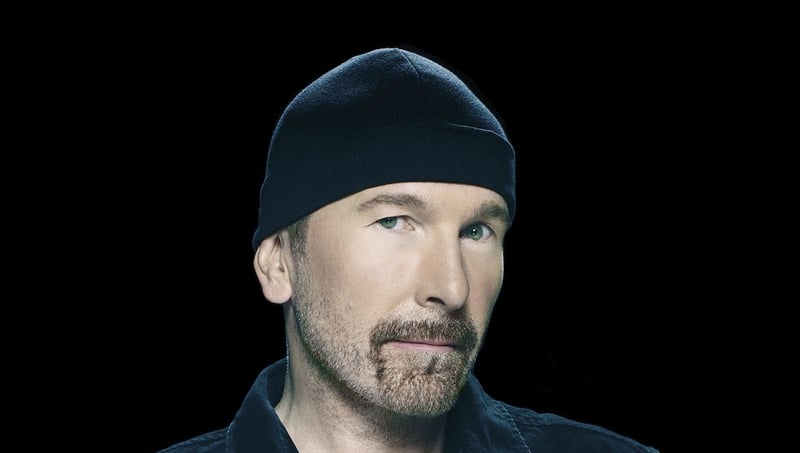
U2 guitarist The Edge has unveiled a sculpture he has been working on, which imagines "a zebra crossed with an Arabian horse" as part of a charity art fundraiser for children and injured jockeys.
The musician worked with his friend and regular collaborator, Irish artist Duda, to create the piece, which is entitled Sheba, for the under stARTers orders 21 horse art exhibition in Naas in Co. Kildare.
The public art exhibition and charity fundraiser saw 21 life-sized fibreglass horses painted by some of Ireland’s most highly-acclaimed artists.
Speaking about his creation, The Edge commented "This is a wonderful initiative to be a part of in aid of two most worthy charities, Irish Injured Jockeys and Sensational Kids.
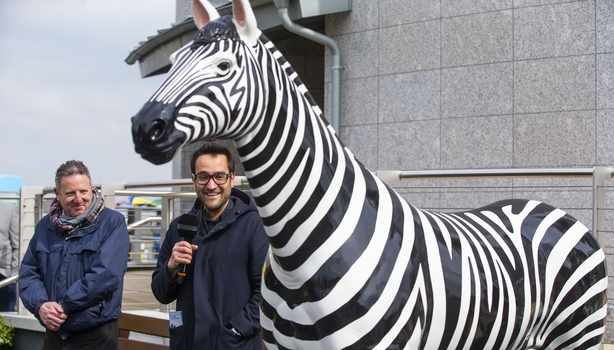
"Duda has captured my vision of Sheba perfectly, I’m thrilled with it. The concept is a simple one: I’ve always loved zebras but as a kid discovered that they could never be tamed or ridden like their cousin the horse. This is my fantasy: a cross between an Arabian horse and a zebra!"
The exhibition was launched at Naas Racecourse on Saturday 21 of Ireland’s top equine artists were asked to paint their own unique version of a life-sized resin fibreglass horse sculpture.
www.rte.ie/
Wednesday, April 3, 2019
No Line on the Horizon: Ten Year Anniversary

Velvety. Groovy. Classic. Revealing…
At ten years of age, No Line On The Horizon, remastered, with new remixes and on double vinyl.
Friends of the band have something to say:
https://u2.tumblr.com/post/182980515775/velvety-groovy-classic-revealing-at-ten-years
https://u2.lnk.to/NLOTH
Friday, March 22, 2019
New career path for Adam Clayton?
Adam Clayton walked the runway on Thursday at the Hermes fashion show in London. Adam tweeted about it from the band's official account, saying he had "stepped into the frame" -- a reference to the name of the show, "Hermes: Step Into The Frame." If that reference wasn't clear enough that he'd actually modeled at the show, and not just attended, an Instagram video by GQ editor Dylan Jones gave it all away:
source: /www.atu2.com
IG: Dylan Jones (dylanjonesgq)
Subscribe to:
Comments (Atom)



